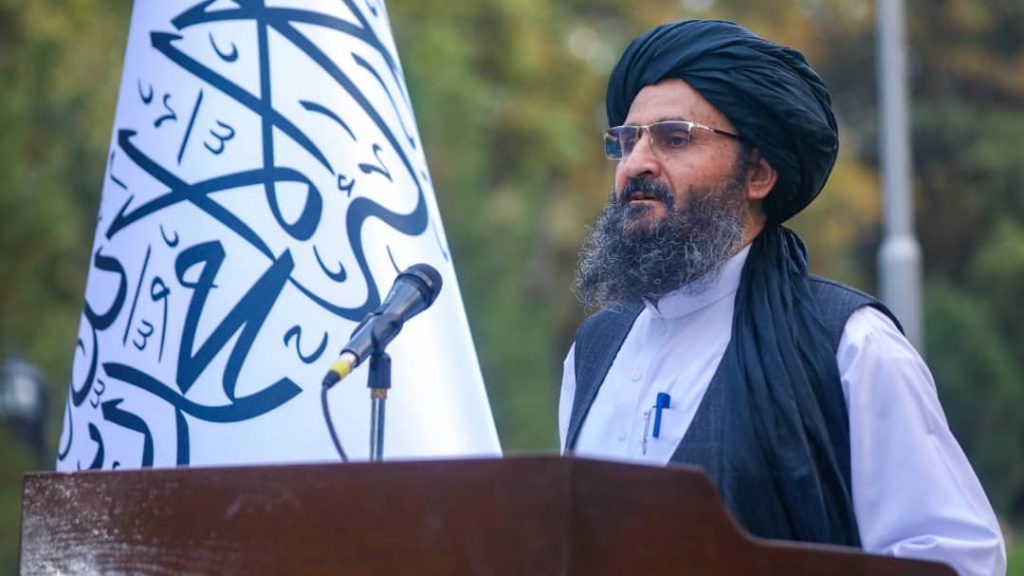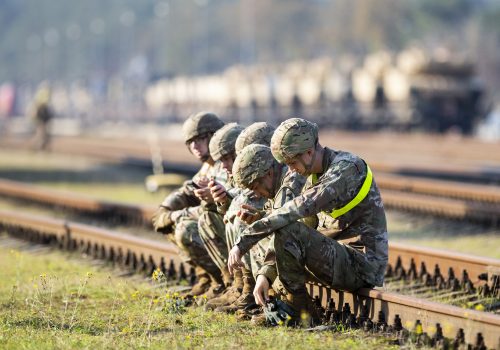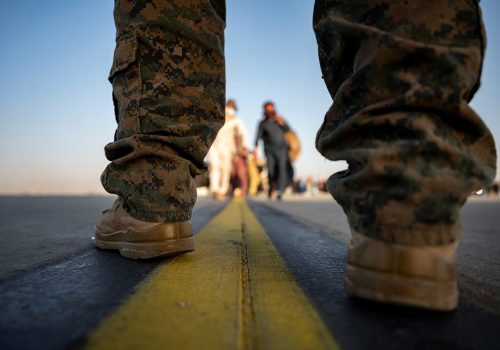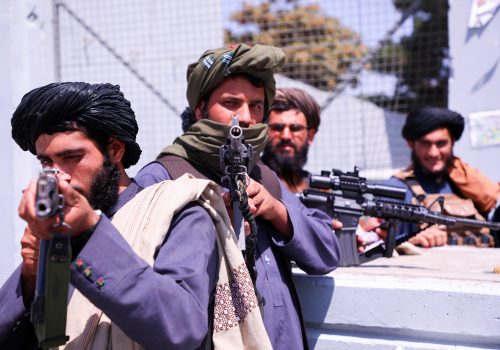Afghanistan is at a delicate moment in its relationship with the outside world. Both the Taliban and most of the international community are taking a broad “wait-and-see” approach, as nations are unsure of how to engage with Kabul after forty years of devastating conflict from the Soviet invasion to the recent US withdrawal.
In terms of humanitarian relief, the international community remains entirely uncoordinated as individual countries continue to roll out their own aid programs (and as Afghan foreign reserves remain frozen). Diplomatically, no country wants to be the first to recognize the Taliban government for fear of legitimizing its rule—and for good reason, since the group still has much to prove if it wants to be accepted by the international community.
But ignoring Afghanistan would be a catastrophic mistake for two key reasons.
First, a lack of international coordination without overarching goals—and without defining the values that should dictate further engagement—will result in ad-hoc policies akin to Washington’s troubled relationship with Pakistan, as well as no real understanding of how recent developments will impact the region in the longer term. Second, it will reduce the international community’s ability to hold the Taliban accountable to its obligations under international human-rights law.
The current approach is short-sighted, and as the Islamic State-Khorasan Province (ISIS-K) continues to threaten both Afghanistan and its neighbors, Washington risks returning to a problematically narrow counterterrorism agenda without any broader plan for what it wants from Afghanistan.
Intersecting crises with global consequences
Afghanistan’s intersecting crises—an impending economic collapse, the COVID-19 pandemic, a deteriorating security situation, and widespread illicit finance and smuggling networks, to name a few—pose an immediate threat to the country itself, the greater region, and the international community.
Although the World Health Organization (WHO) estimates that COVID-19 cases and deaths in Afghanistan are among the lowest in months, the United Nations (UN) stated in July that they “are likely to be under-reported overall” thanks to a lack of widespread testing.
Afghanistan also faces a humanitarian and economic collapse with cataclysmic ramifications. The UN predicts that more than half the country is at risk of starvation this winter, and, given that a lack of access to basic services and a low standard of living are driving factors for militancy, this only complicates the long-term challenge posed by ISIS-K and similar groups. Meanwhile, the Taliban’s historical dependence on illicit finance, smuggling, and criminal patronage will likely only increase, as the group must now run an entire country and provide basic services—from health care and education to security and law enforcement—to millions of people. These networks have huge regional and international entanglements.
As a result, Afghans will continue to suffer. But not only them: Pakistan, which has been directly impacted by Afghanistan’s conflicts for decades (and already hosts millions of Afghan refugees), will also feel the consequences of these crises, as will other countries in the region, with ripple effects across the globe.
The power of a united front
The Taliban, which has been historically vague about its official stance on human-rights law, cannot be held accountable if external powers continue to dump ad-hoc aid into the country without any type of coordination or alignment on big-picture goals. Think of it as a reverse divide-and-conquer approach: The international community fails to elucidate a broader framework for long-term, values-based engagement with Afghanistan, and in turn, international actors strike unilateral deals with the Taliban to serve their own interests. Such a scenario then gives the group leverage and options for maintaining an influx of support without being accountable to anyone.
In order to hold the Taliban accountable to its obligations under international human-rights law, a united global community must first agree to, then communicate, clear requirements for diplomatic recognition.
This is not to suggest that coordinated humanitarian aid be used as a leveraging tactic—aid should enter regardless of the political situation—but rather that the Taliban be forced to reckon with the notion that, for its government to be further integrated into the global political system beyond receiving emergency aid, it must make clear and verifiable commitments under international human-rights law. Aid must not be politicized; diplomatic recognition and engagement, on the other hand, should be.
Most importantly, clear and human-security-centric standards for diplomatic recognition would communicate that those whom the Taliban sees as prospective international partners are aligned on such values, and that the group must at least explore these ideas if there is any hope for diplomatic engagement with the international community. However, using this leverage to hold the group accountable is only possible if external stakeholders have a shared vision for what political engagement with Afghanistan should look like.
What’s to be done
The guiding question must be how—not whether—to engage with Afghanistan. Here’s how the international community can move forward:
- Each of the nations or groups that have hosted multilateral conversations or otherwise played important diplomatic roles in recent years—such as Qatar, Pakistan, India, or the Shanghai Cooperation Organization—must convene as one. This reflects the importance of regional and local convening bodies for Afghanistan’s future, particularly in the wake of Washington’s departure from the country. The region will prove critical in the years to come, as the neighboring countries that these bodies represent would suffer the most (outside of Afghanistan itself) should the situation again spiral into civil war.
- Such a body must draft and agree on a succinct set of values and points for what the international community wants to see from the Taliban government in the short, medium, and long terms—particularly for women and religious minorities. Those might include the re-introduction of education for girls beyond primary school, followed by a percentage-based quota for women in government and public institutions that increases incrementally each year with the eventual goal of gender parity. These ideas must be coupled with a broader attitude change by the Taliban’s leadership—one that endorses equal opportunities for women without resorting to tokenism. Given the group’s extremely precarious grip on power and keen attention to its perception outside of Afghanistan, this leverage has significant potential to support Afghan women and girls as they struggle for equal rights.
- The most crucial point is that humanitarian engagement must enter regardless of the political situation and should be coordinated globally using the collective intelligence apparatuses of a multitude of powers, such as the United States, Pakistan, Iran, Qatar, Turkmenistan, Uzbekistan, Tajikistan, and others. This is to use all available resources, ensure that aid reaches its target population, and minimize corruption and misuse.
Fears of legitimizing the Taliban are not unfounded, and rushing to recognize the group would be ill-advised. That said, global resistance to recognize the Taliban diplomatically must be an intentional and coordinated decision by the international community rather than a product of inaction. The prospect of diplomatic recognition should then be used as leverage to hold the Taliban accountable, though this cannot impact the influx of emergency aid that the country severely needs. The ramifications of an economic or humanitarian collapse in Afghanistan—not to mention a civil war—will reach far beyond its borders, at a minimum impacting the nearly two billion people in South Asia.
Harris Samad is the assistant director of the Atlantic Council’s South Asia Center.

The South Asia Center is the hub for the Atlantic Council’s analysis of the political, social, geographical, and cultural diversity of the region. At the intersection of South Asia and its geopolitics, SAC cultivates dialogue to shape policy and forge ties between the region and the global community.
Further reading
Fri, Sep 3, 2021
American security cooperation needs an ‘integrity check’
New Atlanticist By R. Clarke Cooper
Washington must prove why choosing the United States as a security partner remains the best option.
Thu, Sep 23, 2021
The US can’t fix Afghanistan, but it can still fix NATO
New Atlanticist By Richard D. Hooker, Jr.
Now is not the time for Europe to raise its defense spending or for NATO to extend its reach beyond Europe—especially into the Indo-Pacific region. Rather, it's time to get back to the core focus of NATO.
Fri, Sep 10, 2021
Confronting the disaster left behind in Afghanistan
New Atlanticist By Mir Sadat
The United States screwed up the endgame in Afghanistan once again, but working with allies and private rescue efforts, there's time to make things right.
Image: Taliban leader Mullah Baradar Akhund hosts a reception for a group of ambassadors to the Islamic Emirate of Afghanistan on Oct 1, 2021. Photo by EYEPRESS via Reuters Connect



